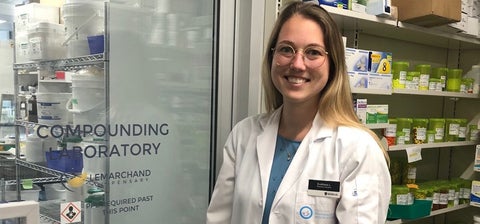
Co-op student reflects on working in Alberta during pandemic

Svetlana Litchmanova worked in a compounding pharmacy in Spring 2020.
Back in April, Svetlana Litchmanova was watching the news about COVID carefully. The pharmacy student was slated to start work in Alberta in May, at Lemarchand Dispensary Pharmacy and Compounding Lab. With travel restrictions being introduced, she wasn’t sure if she would go.
“I did think about cancelling as we heard more about COVID,” Svetlana says, “But I’m glad I didn’t. I’d chosen Alberta because I’d gain skills in pharmacy that I wouldn’t in Ontario and, ultimately, it was a fantastic experience.”
Even before she started at Waterloo Pharmacy, the third-year pharmacy student knew she wanted to use her co-op terms to explore Canada and pharmacy in other provinces. Alberta seemed an obvious choice for both personal and professional reasons; not only was the landscape beautiful, but pharmacists in Alberta have a broader scope than those in Ontario and also make use of the province’s online health record system, Netcare.
Travelling for a work term during COVID-19 was not without its challenges. Svetlana planned her travel schedule around work-required isolation period, causing her to leave Ontario earlier and beginning her co-op term a week later than anticipated. In Alberta, the public health unit was urging physical-distancing and minimizing unnecessary social interaction.
“It’s one thing to be in quarantine an hour drive from your family, even if you don’t visit often,” she says. “The idea that if you need them, they are close is more comforting than knowing that they are actually 3,500km away. This term definitely taught me to be independent in a new way.”
Despite the isolation, Svetlana made the best of her days. At work, she was introduced to new tasks like using Alberta’s Netcare system to conduct medication reviews with patients. She also performed pain assessments, interviewing patients to identify the best treatment option to help manage their pain. Being in Alberta, the pharmacists on Svetlana’s team were then able to prescribe the medication directly based on her recommendations.
“COVID changed how this process worked,” she says. “We switched to conducting assessments over the phone instead of in person which worked quite well! I’d spend half an hour systematically interviewing a patient. We’d come up with a treatment plan, the pharmacists would prescribe it and we’d deliver the medication right to their door.”

The unguator machine (left) used to mix creams. The final product for this medication was put into a tube (right).
The topical creams prescribed were compounded right in the Lemarchand Dispensary Pharmacy. The pharmacy is equipped with several unique spaces called negative pressure labs. When working with hazardous drugs and materials that are used for compounded products, industry standards require that pharmacies have spaces designed to prevent those drugs from escaping into adjacent rooms. To be able to make certain kinds of medications, a pharmacy must have labs that meet specific requirements for air flow, sealing and more.
“Though I have previous co-op experience in compounding, this was my first time working in negative pressure labs,” Svetlana says. “If we needed to compound anything that required use of the level C lab space – for example, hormone compounds – we needed protective face shields and gowns on top of the normal personal protective equipment.”
Compounding has always been an interest of Svetlana’s and she was able to spend one day a week in the compounding lab. On the other days, she conducted patient consultations and supported the many deliveries the Lemarchand Pharmacy carries out. Because the pharmacy has specialized labs for compounding, they have dispensing agreements with other Alberta pharmacies and make compounds for those stores to give out to their patients.

A gummy formulation for a medication.
“One of the biggest differences I noticed here was how health-care professionals treated pharmacists,” she says. “In Alberta, I was pleased to see consistently positive encounters with other professionals which I believe stems from the pharmacists working to their full, expanded scope. By filling more roles in the health-care system, collaboration and respect build between professionals and that ultimately leads to better patient care.”
As Svetlana’s term was drawing to an end, COVID-19 restrictions began to lift and she was able to get out and explore the province.
“I encourage anyone to get out of your comfort zone. Explore a co-op opportunity out of province,” she says. “Aside from the amazing people and great work environment, it was awesome to get a chance to explore new places and make new friends!”
